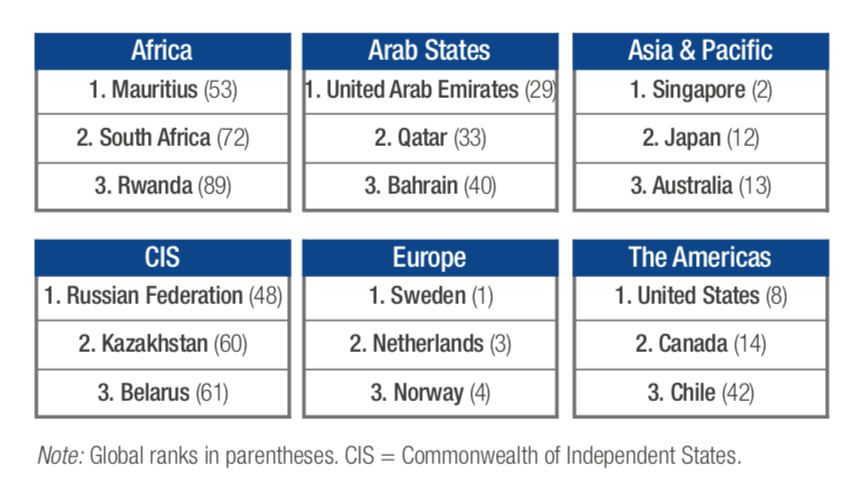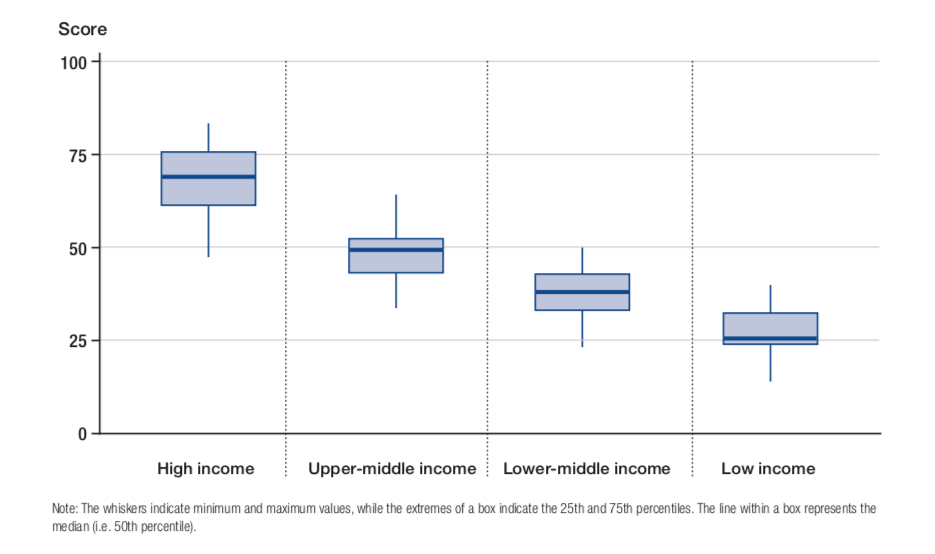According to the 2019 NRI results, the three countries most likely to reap the rewards of the digital future are Sweden, Singapore, and the Netherlands. Unsurprisingly, these three nations also top the rankings for the “Advanced Economies” country group established within the NRI.
Over the next two months, the Portulans Institute plans to release a series of blog posts analyzing each respective country group. The designated country groups are as follows: Advanced Economies, Emerging and Developing Asia, Emerging and Developing Europe, Latin America and the Caribbean, Middle East and Northern Africa, and Sub-Saharan Africa.
The first edition of this blog series will take a look at the Advanced Economies country group. Particular attention will be paid to the idea that although these countries place high on the Index there is still much to be done in terms of improvements and current complacency can lead to future stagnation and or decline.
The NRI champions: Sweden, Singapore and the Netherlands
To begin our analysis let us first analyze the countries that top the Advanced Economies country group. Sweden holds the top spot in the renewed NRI, and this is due to their consistency across all the pillars of the NRI. Sweden ranks in the top 10 in all four pillars (Technology, People, Governance, and Impact) and the top 5 in three of them. Sweden excels in terms of the Governance pillar but notably, their weakest dimension relates to the Individuals (14th) sub-pillar. As a result, in the future, Sweden should formulate policies aimed at raising the skill set of their population in order to maintain their top position within the NRI rankings.

Singapore, the Southeast-Asian island nation, ranks second to Sweden but only by a marginal degree, as such, for all intents and purposes Sweden and Singapore are both equally ready for a global network economy in constant flux. Singapore is a top 10 country in all four pillars and is in the top position when it comes to the Impact pillar, where it does particularly well in terms of the impact of its readiness on the Economy (1st). On the other hand, Singapore does less well when it comes to the People (9th) pillar, where more could be done to boost ICT usage of Businesses (16th).
Rounding out the top 3 is The Netherlands, who in a similar fashion to the other top countries performs well in all four pillars, ranking in the top ten in each of them. The country is particularly strong when it comes to Technology (2nd), where it is the global leader in the Content sub-pillar and has a high level of Future Technologies (8th). In the Impact (5th) pillar, it benefits from solid performances in the Economy (9th) and Quality of Life (7th) sub-pillars. The main weakness for the Dutch is the Individuals (18th) sub-pillar, especially when it comes to increased digital usage.
How far will the technology backlash go in advanced economies?
When discussing the country group of Advanced Economies, it is easy to discuss the things they do well, but it is also important to discuss some of the future obstacles they may face. No obstacle seems to be greater than the growing backlash against major tech nology companies within these nations.
Take for example the United States, which is a country where technology has brought about considerable benefits to people’s lives but notable concerns surrounding the downsides of online technology appear to be growing, as Gallup polls have shown that public sentiment toward the internet industry has declined from 60% of Americans with a positive outlook in 2015 to 43% in 2019.
As data privacy legislation and antitrust measures become more commonplace, leaders in both the private and public sectors within Advanced Economy nations must understand where to draw the line between privacy and societal advancement.
Interestingly, one may ask themselves “where is this non-physical line and how do we find it?” Well, many theories have been suggested regarding this line, as some believe it should be heavily studied and analyzed and also based on each respective nation’s preferences while others simply believe the line should not cross some sort of “creepiness level.”
Regardless of where you see this non-tangible line being drawn in the future, the reality is that the line must and will be shifted, as the public perception of data collection is changing rapidly. To further illustrate this change, according to polls by Gallup, the American public believes internet and technology companies have too much power, they distrust social media companies to make the right decision about their content, and Americans across the political and demographic spectrum believe political leaders are not paying enough attention towards issues regarding technology.
As we enter the new decade, one thing in terms of preferences is clear within Advanced Economies. They are hungry for personalized content, but they are also demanding greater data privacy. On the surface, this may seem like a paradox, but in fact, it is simply a balancing act. As technology companies and countries must learn to understand where to draw the line between data aggregation and how to use data in ways that directly benefit the people they serve.
The key takeaway from all of this is that while prioritizing the balance between privacy and economic advancement may not impact top-line revenue now, the future will be built on companies and countries that can successfully create digital identity solutions, all the while providing consumers the right to protect their data without forfeiting convenience or user experience.




